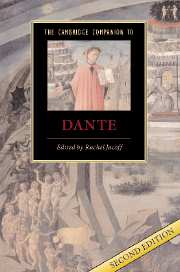Book contents
- Frontmatter
- 1 Life of Dante
- 2 Dante and the lyric past
- 3 Approaching the Vita nuova
- 4 From auctor to author: Dante before the Commedia
- 5 Introduction to Inferno
- 6 Introduction to Purgatorio
- 7 Introduction to Paradiso
- 8 Dante and the Bible
- 9 Dante and the classical poets
- 10 Allegory and autobiography
- 11 A poetics of chaos and harmony
- 12 The theology of the Comedy
- 13 The poetry and poetics of the creation
- 14 Dante and Florence
- 15 Dante and the empire
- 16 Dante and his commentators
- 17 Dante in English
- Further reading
- Index
- Series List
3 - Approaching the Vita nuova
Published online by Cambridge University Press: 28 May 2007
- Frontmatter
- 1 Life of Dante
- 2 Dante and the lyric past
- 3 Approaching the Vita nuova
- 4 From auctor to author: Dante before the Commedia
- 5 Introduction to Inferno
- 6 Introduction to Purgatorio
- 7 Introduction to Paradiso
- 8 Dante and the Bible
- 9 Dante and the classical poets
- 10 Allegory and autobiography
- 11 A poetics of chaos and harmony
- 12 The theology of the Comedy
- 13 The poetry and poetics of the creation
- 14 Dante and Florence
- 15 Dante and the empire
- 16 Dante and his commentators
- 17 Dante in English
- Further reading
- Index
- Series List
Summary
Dante's first book (his libello, or “little book,” as he calls it), marks the beginning of a tendency that will dominate his literary career as a whole - the tendency to edit the self. All of Dante's major works - the Vita nuova, the Convivio, the De vulgari eloquentia, and of course the Divina Commedia - share this pattern of self-commentary on the part of an author who, for some reason, was never content merely to write poetry, but who also felt the need to instruct his reader about how that poetry came into being and how it should be read. Dante's work has been taken seriously by his readers over the centuries, to be sure, but it is fair to say that no one has ever taken it more seriously than the author himself.
The most striking aspect of the Vita nuova, for those who do not merely take its canonical stature for granted, or whose perception of the work is not mystified by the fact of its authorship, is the utter seriousness with which the author sets out to dignify and solemnify the rather innocent (and often mediocre) lyric poems that he composed in his youth. The Vita nuova gives the impression that Dante was unwilling to allow the poems to stand on their own but strove, through his prose commentary, to give them the sort of weight they lacked in their own right. There is far more to the libello than this, as we shall see, but it is important to state at the outset that we are dealing here with an author who had an inordinate anxiety about defining, self-consciously and for the most part retrogressively, the nature and ambitions of his literary vocation.
- Type
- Chapter
- Information
- The Cambridge Companion to Dante , pp. 35 - 45Publisher: Cambridge University PressPrint publication year: 2007

